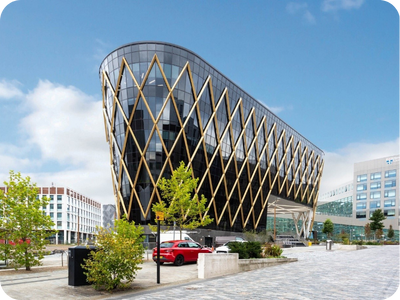Shining a light on the North East's life science innovation

In this blog, Abby Clark, Manufacturing Programme Manager at BIA, builds on a round table the BIA hosted with Chi Onwurah MP (Chair of the Science, Innovation and Technology Committee) and Newcastle life science companies to explore the landscape and the drivers which make the sector strong, yet undervalued.
Lightbulbs to islets: a home for innovation

Innovation has always been at the heart of the North East. Back in 1878, Joseph Swan presented the first incandescent light bulb to a lecture theatre in Newcastle. Keeping it topical, another northerner, John Henry Holmes invented the light switch as we know it today.
Amongst other critical northern innovation (such as railways, water purification, hydraulics and the power grid), a recent breakthrough from Newcastle University has seen the development of islet cell transplant therapies that aim to provide long-term freedom from insulin injections without the need for toxic anti-rejection drugs.
The groundbreaking research coming out of the region is just as compelling a reason to celebrate the North East as the people behind it, their collaborative spirit, deep expertise, and unshakable commitment to impact a life sciences ecosystem that punches well above its weight.

What makes the region's sector great?
A well-networked community, investment bodies and a strong manufacturing base add to the academic excellence in the region. The Newcastle Helix, a hybrid city quarter for tech and science businesses, acts as a hub for local talent to work and network alongside each other. Similarly, NETPark in County Durham operates in a collaborative model.

Northstar Ventures stands out as a major enabler in the region, investing in ambitious, high-growth companies that are tackling global issues like climate change and healthy ageing. Their investment portfolio includes exciting BIA member companies such as LightOx and MarraBio, covering both a light-activated oral gel to target mouth cancer and technology to produce bioactive protein alternatives economically at scale. Adding to its growing portfolio in the region, Northstar Ventures played a key role in Newcells Biotech’s £1.2 million raise, strengthening both its commitment to the North East and its support for BIA innovators.
The North East’s innovation ecosystem thrives because of its robust manufacturing base, which ensures that scientific breakthroughs don’t just stay in the lab, they have the potential to reach the market. With leading pharmaceutical sites based in the region, such as GSK, Piramal, Fujifilm Biotechnologies, Sterling Pharma, Accord Healthcare, Pharmaron and Quotient Sciences, the region is well set to translate ideation into product. A key benefit of operating in the North is competitive infrastructure and costs, meaning overheads for translation and manufacture are reduced.
Challenges and opportunities for growth
Despite strong academic output and early-career talent, the North East faces hurdles in scaling its life sciences sector. Attracting mid-level scientists and commercial managers remains a priority to avoid limiting career progression and pushing talent elsewhere.
There’s also significant opportunity in translating research into commercial success, particularly in Chemistry, Manufacturing and Controls (CMC) and clinical trial development. A lack of commercial expertise and late-stage funding often means many innovations leave the region to scale elsewhere, despite strong infrastructure. While early innovation is strong, many companies find it challenging to progress through expensive later-stage clinical trials due to a lack of capital and risk appetite among some UK investors.
Life sciences is a complex sector with unique challenges, such as long development timelines and stringent regulatory pathways, it requires investors with specialised knowledge to navigate it effectively. In regions where local investment expertise in this area is still developing, companies often seek support from more mature markets, such as the US. To retain and grow high-potential businesses locally, enhanced access to targeted financial support and sector-savvy capital is essential.
Building momentum with government and policy support
While good intent has been signalled, the North East’s life sciences sector needs more targeted, long-term policy support to reach its full potential. Regional investment must go beyond infrastructure to include tailored funding for research commercialisation, clinical trial development, and translational science, areas where gaps persist.
Local leadership has a crucial role to play in shaping the future of life sciences in the North East. By giving regional authorities greater influence over innovation funding and aligning this with targeted skills and talent initiatives, the region can position itself as a globally recognised life sciences hub. The recent announcement of £86 billion R&D funding for science and technology will give regional leaders the government backing to develop ‘innovation clusters’ across the country, helping unlock the talent and opportunity in every region and nation.
This was evident at a recent roundtable hosted by the BIA with Chi Onwurah MP, both the local representative for Newcastle Central and Chair of the Science, Innovation and Technology Committee. The discussion reinforced many of the themes explored in this blog, but more importantly, it showcased the strong alignment between the goals of local leaders and the companies operating within the area.
What’s next for the region?
The North East has all the ingredients to become a powerhouse for life sciences with world-class research, a strong pipeline of talent, and an emerging ecosystem of ambitious, high-growth companies. With the right policy interventions, targeted investment, and continued collaboration between academia, industry, and government, the region is well-placed to lead in areas like healthy ageing, advanced therapeutics, and manufacturing innovation. The story of life sciences in the North East is only just beginning. The foundations are in place, and now it is time to build.
Don't sell yourself short. Get on board and experience the richness of what is on offer from BIA.




